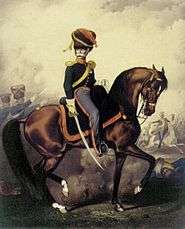Berek Joselewicz
| Berek Joselewicz | |
|---|---|
|
Lithograph (publ. in 1904) | |
| Born |
September 17, 1764 Kretinga, Samogitia, Polish-Lithuanian Commonwealth |
| Died |
May 5, 1809 (aged 44) Battle of Kock, Kock, Poland |
| Cause of death | Killed in action |
| Other names | Dow Baer Joselewicz |
| Awards | Virtuti Militari |
Berek Joselewicz (September 17, 1764 – May 15, 1809) was a Jewish-Polish merchant and a colonel of the Polish Army during the Kościuszko Uprising. Joselewicz commanded the first Jewish military formation in modern history.[1][2]
Life
Dow Baer (Berek) Joselewicz was born in Kretinga, in the county of Kowno, part of the Troki Voivodeship of the Polish-Lithuanian Commonwealth. He worked as a financial agent for a local Polish magnate, Prince Massalski, the lord of Kretinga, and bishop of Wilno. Joselewicz often traveled abroad in pursuit of various tasks, during which he learned to speak French. He spent some time in Paris during the beginning of the French Revolution, and it is thought that this may have later inspired him to join Tadeusz Kościuszko, who advocated similar causes of brotherhood and equality.

Joselewicz initially served in the Polish militia before petitioning Kościuszko for permission to form an all-Jewish unit. On September 17, 1794, Kościuszko officially announced the creation of the unit. Joselewicz, along with another Jew named Joseph Aronowicz, issued a patriotic call-to-arms in Yiddish denouncing Russia and Prussia, eliciting hundreds of volunteers, mostly poor tradeworkers and artisans. Five hundred men were eventually accepted and formed into a cavalry regiment. At Joselewicz's request, they were allowed to keep their religious customs, including access to kosher food, abstaining from combat on the Sabbath when possible, and growing their beards. Joselewicz's unit was popularly known as "the Beardlings". They took part in the 1794 defence of Praga, in which the unit was wiped out, with only few men (including Joselewicz) surviving the battle. Joselewicz himself was taken prisoner by the Russians.[1]
After the defeat of the Kościuszko Uprising, Joselewicz left for Galicia and then for Italy. There he joined the Polish Legions under Henryk Dąbrowski. As a commander of a sabre company in Polish cavalry units, he fought in various battles of the Napoleonic period. Among them were the battles of Trevia, Novi, Hohenlinden, Austerlitz and Friedland. He was awarded the Knight's Cross of the Virtuti Militari medal and the Legion of Honour with a Golden Cross for his merits. He remained in the army as squadron leader in the 5th Mounted Riflemen Regiment following the constitution of the Duchy of Warsaw (Księstwo Warszawskie) in 1807. From 1807 he fought in various battles in Poland. He was killed in the Battle of Kock in 1809 during an encounter with a unit of Austrian hussars, and today his grave has become a popular tourist attraction.

Berek's son, Josef Berkowicz (1789–1846), also fought in the Battle of Kock, and later served as a squadron chief during the November Uprising of 1830, during which he also attempted to convince Jewish soldiers to desert the Russian army and join the Poles. Berkowicz later moved to England and wrote a novel. Berek's widow and son had received a pension until 1831.
The common Polish expression "like Berek at Kock" ("Jak Berek pod Kockiem.") describes a hopeless situation to this day.
He was honored by a postage stamp as a "A Jewish Fighter for Polish Freedom", issued jointly by Polish and Israeli postal services.
See also
- Jewish City Guard
- Napoleonic Wars
- History of Poland
- History of the Jews in Poland
- Berek Joselewicz in the YIVO Encyclopedia of Jews in Eastern Europe
References
- 1 2 Shmuel Spector; Geoffrey Wigoder (2001). The Encyclopedia of Jewish Life: Before and During the Holocaust. New York University Press. p. 1426. ISBN 978-0-8147-9356-5.
- ↑ M. Kasprzyk (2007), Berek Joselewicz : The Partitions of Poland: 1772 - 1795. Internet Archive.
External links
- Diapositive: Traces of the Past
- Jewish Encyclopedia: Berek Joselewicz
- Jewish Encyclopedia: Josef Berkowicz
- This Month in Jewish History: September, from the World Zionist Organization
.jpg)